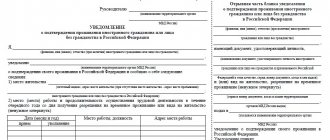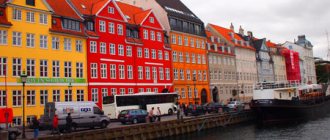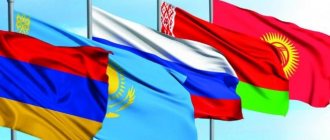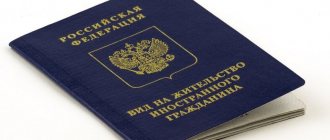What is a residence permit for a foreigner and stateless person in Russia?
According to the law of the Russian Federation, a residence permit is not only a documentary permission to stay in the country, but also certifies the identity of the LBG. First, let's figure out what the difference between these concepts is:
- A foreign citizen is a person who has the citizenship of another state. Both the home state and the host country participate in protecting its interests.
- LBG is a person who, for some reason, has lost his citizenship or has no evidence of its existence. It happens that people independently refuse to belong to one state for personal reasons. Only after receiving official status can a person count on protection from the Russian Federation.
In both cases, a document is issued on the territory of Russia on the basis of a temporary residence permit, which has been valid for a year, but only until its expiration date. Although you can apply for a residence permit after 6 months.
Attention! The residence permit will be valid for 5 years, after which it can be renewed for the same period an unlimited number of times (read about the validity period of the residence permit here).
The application for extension must be submitted before the end of the previous period (what other documents are needed to extend the residence permit are described here). After 5 years, a citizen has the right to submit an application for assignment of Russian citizenship.
There is a category of citizens who can obtain a residence permit immediately, without living under a temporary permit:
- citizens of Belarus;
- citizens and LBG from Turkmenistan;
- highly qualified specialists and their family members;
- native speakers of Russian.
Citizenship of the Russian Federation without a residence permit for applicants by marriage and common children
Not so long ago, namely in July 2021, a rule came into effect according to which citizens who have a husband or wife with Russian citizenship and a child in common with him/her can apply for citizenship with either a temporary residence permit or a residence permit. That is, if you already have a temporary residence permit, then you do not need to obtain a residence permit in this case. You can immediately bring documents for citizenship.
Note that the simplification applies only if two conditions are met: marriage with a citizen of the Russian Federation + a common child. If you are married to a Russian man/woman, but have no children together, then to apply for citizenship you will need to obtain a residence permit.
Design features
The difference is that a foreigner has documents that confirm his identity. LBG may not have such evidence, therefore, in order to be granted a residence permit, all stateless persons over 12 years of age must undergo fingerprinting and digital photography.
In general, a residence permit gives the same rights to both. The only difference is in the design.
- Residence permit for foreigners made in the form of a mark in the main identification document, plus they issue a document of a special type with a blue cover and the name “Residence Permit of a Foreign Citizen”.
- For LBG - This is a standard document in a green cover with the title “Residence permit for a stateless person.”
Is it possible to bypass a temporary residence permit and residence permit if you are married to a Russian?
Marriage with a citizen of the Russian Federation provides certain advantages when legalizing a foreigner. For example, a temporary residence permit is issued without a quota. But marriage does not free a migrant from the need to obtain both a temporary residence permit and a residence permit.
But family migrants will not have to live with a residence permit status for five years. Once the official union is three years old, you can apply for citizenship by marriage.
But if the marriage has common children , then the process will become easier. Such applicants received the right to apply for citizenship with only a temporary residence permit or temporary residence permit. In addition, they do not have to wait until the marriage is three years old. Learn more about filing for marriage and children.
Grounds for extradition
The law states that legal grounds are required to grant a residence permit. Let's figure out what this means in both cases.
Grounds for a foreign citizen:
- Residence for more than a year on the basis of a temporary permit.
- Having a source of income that covers the cost of living. The document must confirm income for a period of no more than a year.
- Availability of housing.
- A citizen is a highly qualified specialist who resides in the country on the basis of employment.
- The citizen is a native speaker of Russian.
- Married to a resident of the Russian Federation.
- There are children with Russian citizenship.
- One of the parents or both have Russian citizenship.
- Investments in the Russian economy in the amount of 100 million rubles with payment of taxes over 6 million rubles.
- Business owners in the Russian Federation with a turnover of more than 10 million rubles.
The basis may be an application and an existing temporary permit; other points may provide additional benefits for faster receipt of a residence permit.
Reasons for LBG:
- statement;
- availability of a temporary residence permit;
- stay in Russia for more than a year;
- was born in Russia or the RSFSR;
- one or both parents are citizens of the Russian Federation;
- married to a resident of the country;
- there is a child with Russian citizenship;
- availability of a source of income.
Why are additional reasons needed? Despite the fact that the International Convention adopted in 1954 calls for the protection of the interests of stateless persons, your application may be refused. The fact is that a quota is allocated for obtaining a residence permit for foreigners and LBG combined . The number of documents issued is limited. This is where additional reasons come in handy.
Obtaining citizenship
The final stage is obtaining Russian citizenship. To obtain citizen status, you will need to fulfill the following conditions:
- The applicant for citizenship must have an official income;
- An applicant for citizenship must have a residence permit;
- An applicant for citizenship must speak and write fluently in Russian;
- An applicant for citizenship must live in Russia for five years.
If all conditions are met, then you can begin to obtain citizenship. To begin, you will need to collect and submit the following documents:
- Standard passport photos, 4 pieces;
- Copies of all available temporary residence permits and residence permits (notarization required);
- Birth certificate;
- Document confirming the availability of education;
- Medical certificate confirming the absence of HIV;
- A document confirming the fact of proficiency in the Russian language (certificate of passing a state test);
- Receipt of payment of the duty ( 3500 rubles ).
After this, the procedure for checking all these documents begins. It is worth warning that it is very long - its maximum limit is one year. However, after all documents are received, the stateless person receives a passport and becomes a full citizen of the Russian Federation.
Receipt procedure
Reference! In order to obtain a residence permit, you must submit an application to the Main Migration Department of the Ministry of Internal Affairs (the Federal Migration Service no longer exists) with the provision of the necessary documents.
Documents for a foreigner:
- Identity card, which is a passport of a foreign country.
- Temporary residence permit.
- Identification documents for children under 14 years of age.
- Consent of a minor 14-18 years old.
- Receipt for payment of state duty.
- Residents for more than 3 years can provide a document for the purchased residential premises.
- Other documentary grounds.
- A medical examination document confirming the absence of dangerous infectious diseases, drug addiction and HIV.
For LBG everything is the same, but there are some differences:
- instead of an identification document, one can provide proof of identity from the state in which he previously resided;
- any other documents that can confirm a person’s personal data.
In addition, you will have to prove the accuracy of the data provided in the following ways:
- Outlining your biography.
- Notarized copies of parents' passports.
- An existing birth certificate (it can be restored at the registry office).
- Certificates of registration, current or one that once existed. Departure sheets or archival certificates.
- Presentation of witnesses confirming the person's identity.
Important! LBG may be asked to provide other data, as well as undergo a fingerprint examination.
Establishing the identity of an individual
Establishing the identity of an individual
The procedure for obtaining citizenship begins with a very important step—identification. This procedure involves submitting documents that serve as proof of identity. This could be any foreign documents, a birth certificate, an old invalid passport.
However, the applicant does not always have such documents. In this case, the stateless person will need the help of the Federal Migration Service. Methods for establishing identity are very diverse - from fingerprint examination to requesting foreign countries to provide copies of documents.
The procedure itself goes as follows:
- A stateless person submits a minimum package of documents to the FMS office: an identity card, a registration document, a detailed biography, a receipt for payment of fees;
- A FMS employee conducts a survey and fills out the necessary forms;
- All collected information is verified. The check itself takes quite a long time, since you have to make a lot of requests. At the same time, its terms may be extended due to the fact that a stateless person may be called to the FMS office for additional consultations. However, the inspection period cannot exceed three months;
- A stateless person is issued a document that is a temporary replacement for a passport of a citizen of the Russian Federation.
General procedure for admission to Russian citizenship: basic requirements
The general procedure and main issues of admission to Russian citizenship are regulated by the Federal Law “On Citizenship of the Russian Federation” (hereinafter referred to as the Law) and the “Regulations on the procedure for considering issues of citizenship of the Russian Federation”, approved by Presidential Decree No. 1325 - 2002 (hereinafter referred to as the Regulations).
Foreign citizens and stateless persons have the right to apply for Russian citizenship subject to the following general conditions (Article 13 of the law):
- availability of legal capacity;
- reaching the age of 18;
- residence in Russia from the date of obtaining a residence permit for five years continuously;
The period of residence is considered continuous if a person travels outside Russia for no more than three months within one year. The period of residence in Russia for persons who arrived in the Russian Federation before July 1, 2002 and do not have a residence permit is calculated from the date of registration at the place of residence;
- obligation to comply with the Constitution and legislation of Russia;
- having a legal source of livelihood;
- knowledge of Russian language;
The following are exempt from submitting documents confirming knowledge of the Russian language: men who have reached the age of 65 years, and women who have reached the age of 60 years; incapacitated persons; disabled people of group I.
The period of residence from the date of obtaining a residence permit is reduced to one year in the following cases:
- the person has high achievements in the field of science, technology and culture;
- the person has a profession or qualification that is of interest to Russia;
- granting a person political asylum on the territory of Russia;
- recognition of a person as a refugee.
A person who has special services to the Russian Federation may be granted citizenship without meeting the specified conditions.
Citizens of states that were part of the USSR, serving at least three years of military service under a contract in the RF Armed Forces, other troops or military formations, have the right to apply for Russian citizenship without complying with the conditions for the period of residence in Russia and without submitting a residence permit.
Residence permit without observing the period of residence in Russia as a condition for obtaining Russian citizenship
Immediately after obtaining a residence permit and permanent registration at the place of residence, that is, without complying with the conditions for the period of residence, the following categories of persons have the right to submit an application for admission to Russian citizenship:
- former citizens of the USSR
who are stateless persons who have legal capacity, who lived and are living in states that were part of the USSR, and who have not received the citizenship of these states, if the application for citizenship was submitted on the territory of Russia;
- those born on the territory of the RSFSR
and who had citizenship of the former USSR;
- citizens of the Republic of Belarus, the Republic of Kazakhstan, the Republic of Moldova or Ukraine; - recognized as native speakers of the Russian language,
if these persons or their relatives in a direct ascending line permanently reside or previously permanently resided in the territory of the Russian Federation or in the territory that belonged to the Russian Empire or the USSR, within the State Border of the Russian Federation;
The procedure for recognizing persons as native speakers of the Russian language is regulated by Art. 33.1 of the law and Order of the Ministry of Internal Affairs of Russia dated April 16, 2020 N 227.
- spouse of a citizen of the Russian Federation
living in Russia, if at the time of filing the application they have been married for at least three years;
- having a legally capable son or daughter who is a citizen of the Russian Federation
and has reached the age of eighteen;
- having a child who is a citizen of the Russian Federation
- in the event that the other parent of this child, who is a citizen of the Russian Federation, has died or has been declared missing, incompetent or limited in capacity, deprived of parental rights or limited in parental rights by a court decision that has entered into legal force ;
- having a son or daughter who is a citizen of the Russian Federation,
who has reached the age of eighteen years and has been declared incompetent or limited in legal capacity by a court decision that has entered into legal force - if the other parent of these citizens of the Russian Federation, who is a citizen of the Russian Federation, has died or by a court decision, entered into legal force, is declared missing, incompetent or limited in legal capacity, deprived of parental rights or limited in parental rights;
- having at least one parent who is a citizen of the Russian Federation
and lives in Russia;
- who, after July 1, 2002, received professional education
in basic professional educational programs that have state accreditation in educational or scientific organizations of the Russian Federation on its territory and who are working in the Russian Federation for a total of at least one year before the date of application for citizenship.
Moreover, during the specified period, in relation to such foreign citizens and stateless persons, the employer must accrue insurance contributions to the Pension Fund of the Russian Federation; -individual entrepreneurs
carrying out business activities in the Russian Federation continuously for at least three years preceding the year of applying for citizenship, in the types of economic activities established by Decree of the Government of the Russian Federation of September 30, 2014 N 994.
Moreover, during the specified period, the amount of taxes and fees paid by such persons in each calendar year (with the exception of property tax for individuals, land tax, transport tax, state duty and refunds of amounts overpaid in accordance with the legislation on taxes and fees during the specified period and (or) excessively collected taxes and fees) and insurance contributions to the Pension Fund is at least 1 million rubles; - investors
whose share of contribution to the authorized (share) capital of a Russian legal entity operating on the territory of Russia in the types of economic activities established by Decree of the Government of the Russian Federation of September 30, 2014 N 994 is at least 10 percent continuously for at least three years preceding the year of circulation application for citizenship.
In this case, the amount of the authorized (share) capital of such a legal entity must be at least 100 million rubles and during the specified period the amount of taxes and fees paid by such a legal entity in each calendar year (with the exception of state duties and refunds of amounts overpaid and ( or) excessively collected taxes and fees) and insurance contributions to the Pension Fund amount to at least 6 million rubles; - those carrying out labor activities in Russia
in a profession (specialty, position) included in the List approved by Order of the Ministry of Labor of Russia dated November 25, 2019 N 734 n, at least one year before the day of applying for citizenship. Moreover, during the specified period in relation to For these persons, the employer must pay insurance contributions to the Pension Fund of the Russian Federation.
The above-mentioned persons are also not subject to the requirement of having a legal source of livelihood.
Obtaining Russian citizenship with a temporary residence permit: who has the right to apply for citizenship
If they have a temporary residence permit and temporary registration at their place of residence on the territory of the Russian Federation, they have the right to apply for Russian citizenship:
- spouse of a citizen of the Russian Federation
living in Russia, if there are common children in the marriage;
- veterans of the Great Patriotic War
who had citizenship of the former USSR and living on the territory of the Russian Federation.
These persons do not need to obtain a residence permit. The conditions regarding the period of residence in Russia from the date of receipt of a residence permit and the availability of a legal source of livelihood also do not apply to them.











